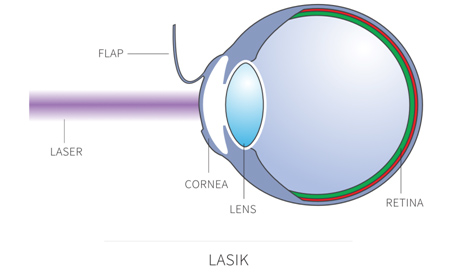Laser Eye Surgery
Laser eye surgery is a procedure to correct vision by reshaping the cornea using an excimer laser. The most common type of laser eye surgery today is known as LASIK – this is short for (laser-assisted in situ keratomileusis). LASIK is a very quick procedure and has become the gold-standard of laser eye surgery. Technological advances combined with years of surgical expertise now mean that fantastic results can be achieved.
I also offer LASEK laser eye surgery – this is a similar treatment to LASIK but has certain advantages for specific types of patients.
LASIK Laser Eye Surgery
LASIK stands for laser-assisted in situ keratomileusis. It is the most advanced, safest and accurate form of laser eye surgery today to correct short sight (myopia), long sight (hyperopia) and astigmatism.

In LASIK a flap is created and the cornea then reshaped by an excimer laser to correct vision. Initially a small blade known as a microkeratome was used to create the flap. Laser eye surgery in my clinic is now a completely blade-free process where I use a ‘femtosecond’ laser to make the flap.
Post Lasik Treatment
Patients are given standard eye drops (anti-inflammatory, antibiotic and lubricant drops) to ensure comfort and an optimum result. The entire process is over within 15 minutes and results are usually apparent immediately.
Today the technology is so advanced, the skill of the surgeon so precise and the understanding of the procedure so thorough, that life changing results can be achieved consistently. Lasik is a very safe procedure. Both eyes are treated on the same day and the time taken to correct the vision is very quick. Many patients even return to work the next day!
Advantages of LASIK
The use of the femtosecond laser and innovations in the excimer lasers used in laser eye surgery also mean that there is no corneal scarring involved in treatment. Visual recovery is now extremely quick – sometimes within hours.
No eye pads are needed after the treatment, only eye shields for sleeping during the first 2 weeks, and the only necessary aftercare consists of drops administered by the patient.
